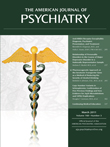Prefrontal Cortical Deficits and Impaired Cognition-Emotion Interactions in Schizophrenia
Abstract
Objective:
Despite schizophrenia patients' reports of diminished experience of emotion in interviews and self-report measures, their emotional experience in the presence of emotional stimuli and in daily life (“in the moment”) appears largely intact. To examine emotion-cognition interactions, the authors tested the hypothesis that schizophrenia patients have unimpaired in-the-moment emotional reactivity but have a deficit in prefrontal cortical mechanisms needed to maintain and report on experience following exposure to emotional stimuli.
Method:
Using a slow event-related functional MRI paradigm, the authors examined the brain activity of 23 schizophrenia patients and 24 healthy comparison subjects during trials in which they viewed an affective picture and, after a delay, reported their emotional experience while viewing it.
Results:
The patients' self-reports of emotional experience differed from those of the healthy subjects when they rated their experience on dimensions inconsistent with the stimulus valence but not when the dimension was consistent with it. In the presence of emotional stimuli, brain activity in the patients was similar to that of the comparison subjects. During the delay, however, patients showed decreased activation in a network of brain structures, including the dorsolateral prefrontal cortex and other prefrontal, limbic, and paralimbic areas. In patients, the delay-related response of the dorsolateral prefrontal cortex to pleasant stimuli correlated negatively with an anhedonia measure.
Conclusions:
These results suggest that schizophrenia is characterized by a failure of prefrontal circuitry supporting the link between emotion and goal-directed behavior and that the failure of this mechanism may contribute to deficits in processes related to emotion-cognition interaction.



